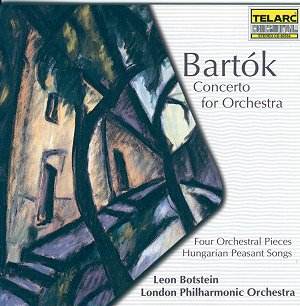In his interesting essay which accompanies this CD, Leon Botstein, who is perhaps better known as an academic than as a conductor, makes a good case for not overlighting the folk sections found in all of this music, at the expense of the lyricism and complexity of counterpoint which is fundamental to Bartók's compositional style. In the two lesser known works - the Four Orchestral Pieces and the Hungarian Peasant Songs - this leads to clean cut and engaging results, helped greatly by Telarc's fine DSD recording and the LPO's renowned virtuosity.
In the slow moving Praeludio of the Four Orchestral Pieces the playing has a real nobility and the influence of both Debussy and Ravel is fascinatingly contrasted with the composer's own Hungarian roots. Botstein is, perhaps, better at portraying colour than he is passion, although the 'horror movie' style music Bartók composed for the fourth piece - shades of The Miraculous Mandarin here - is very well characterised.
The Peasant Songs also benefit from this treatment - one comes away from this performance struck more by the integrity of the music than by any overwhelming thoughts of picture-book romping peasants.
All well and good, but Botstein's admirable self-control prevents him from fully exploiting the myriad of brilliant effects Bartók calls for in his masterpiece the Concerto for Orchestra. It is as if the thought of having to compete with some of the greatest conductors in the world, both past and present, made Botstein more than usually cautious when conducting this work. A halfhearted Concerto for Orchestra is doomed to disappoint and I am afraid this is what we have here.
The first movement, however, does not so much suffer from the conductor's intellectual policies as it does from something much more mundane - a too slow tempo. This, for example, creates a severe lack of frisson at the timpani's entry at 3.23 and the brass players are clearly at sea at key moments such as around 8.30, nearing the end of the movement.
Bartók himself described the second movement 'Giuoco delle coppie' as having 'brilliant passages' but one would hardly recognise this in this performance.
The Elegia is, not surprisingly, much better as it incorporates those colours which Botstein finds easiest to convey. The end of the movement is particularly successful, the flute's famous passage beautifully achieved and perfectly balanced. The Intermezzo interrotto, however, is dismally under characterised. There has, in this music, to be either great warmth of tone or immense passion. Here it receives neither.
The sequence with harp and the strings playing harmonics (here at 4.15) in the Finale is played at too fast a tempo which causes a damaging lack of contrast with the following fugal section.
At the very end of this well-filled disc is the original, shorter ending of the last movement which, for those who have not heard it before, is something of a surprise. Although Bartók continued to claim his contentment with his original thoughts, he was undoubtedly right to make the change to the version familiar in concerts and previous recordings. Not that this is a first recording of the original ending - both Slatkin and Gatti included it as an 'extra' track on their BMG recordings.
If the coupling particularly appeals, you might consider picking up this CD. It is certainly different from most Bartók offerings. Otherwise try Gatti (Concerto and Divertimento for Strings) on Conifer or the classic Reiner recording of the Concerto (with the Music for Strings, Percussion & Celesta and the Hungarian Sketches) on RCA at mid price.
Simon Foster
